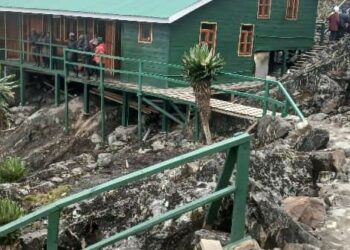By Mike Ssegawa
For decades, Egypt and Ethiopia have been regarded as sworn enemies whose indifference arose from the lucrative River Nile waters.
But on Thursday, President Yoweri Museveni managed to entice the two rivals to discuss about the conflicted waters. The Egypt President Gen. Abdel Fattah El-Sisi and Ethiopia Hailemariam Desalegn were seen shaking hands after busy discussion.
Meeting took place at State House Entebbe ahead of Nile Basin Summit at Speke resort in Kampala.
In 2013, Egypt’s then-president Mohamed Morsi said that “all options” including military intervention were on the table if Ethiopia continued to develop dams on the Nile River.
Egypt fears the Ethiopia dam projects, will reduce the downstream flow of the Nile, which 85 million Egyptians rely on for almost all of their water needs. Officials in the Ministry of Irrigation claim Egypt will lose 20 percent to 30% of its share of Nile water and nearly a third of the electricity generated by its Aswan High Dam.

Egypt is entirely dependent on other states for its water, almost all of which comes from the Nile. Its four principal sources rise several hundred kilometers beyond Egypt’s southern border: the Blue Nile, Sobat and Atbara and its tributaries located in Ethiopia, which provide around 80%, and the White Nile in Uganda, which provides the rest.
Egypt’s share of Nile water has until now been regulated by a 1959 agreement with Sudan, under which Egypt gets 55.5bn cubic meters a year and Sudan 18.5bn. (The annual flow averages 84bn cubic meters, 10bn of which evaporate from Lake Nasser, created by the construction of the Aswan Dam, which came into operation in 1964.) This agreement allotted nothing to Ethiopia and other upstream states.
In 2010 Ethiopia secured a treaty reorganizing water-management and construction projects, the New Nile Cooperative Framework Agreement. Burundi, Kenya, Uganda, Rwanda and Tanzania are signatories.
Under this treaty, a commission representing all the signatories will approve (or reject) large-scale hydraulic projects, dams, canals and anything else that has an impact on the course, volume or quality of the Nile’s waters.
Recently Egypt appealed to international bodies to force Ethiopia to halt construction of the dam until its downstream impact can be determined. And while officials here hoped for a diplomatic solution to diffuse the crisis, security sources said Egypt’s military leadership is prepared to use force to protect its stake in the river.
Have something to add to this article? Send to info@watchdog.co.ug or whatsapp up us +256752545880
Do you have a story in your community or an opinion to share with us: Email us at editorial@watchdoguganda.com











